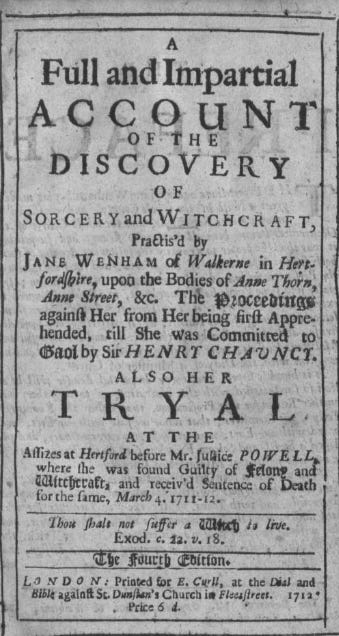ESSAY: The trial of Jane Wenham and the end of English witch trials
What a 1712 witchcraft case tells us about how substantial law and process can be used in a highly charged political context
In 1712 Jane Wenham was tried and convicted as a witch, and she was sentenced to be hanged.
Her case is well-known among historians and history students partly because it is usually held to be the last of the English witch trials: the last trial we know to have actually taken place that ended with a conviction where the offence was one of witchcraft.
(The are sometimes claims for a later English trial which seems to exist only in pamphlet form, and there were trials under surviving witchcraft legislation up to the twentieth century but for the deception offence, rather than for witchcraft itself - an offence which was abolished in 1735.)
But the main reason for the Wenham case being well-known among historians and history students is not so much that it was the last trial, but because of what happened with the trial.
This is the case which many point to as showing that the legal system no longer regarded witchcraft as credible, even if non-lawyers continued to do so.
The trial judge Sir John Powell is even quoted as saying - when faced with evidence that someone flew through the air - that flying through the air it was not an offence known to the laws of England.
Nonetheless the jury convicted, and Wenham was sentenced to die.
The combination of the case being the last trial/conviction for witchcraft and the amusing example of judicial scepticism, means that the case is a handy factoid for those want a marker for the end of witchcraft being taken seriously by the legal system, before we come to the Enlightenment of the eighteenth century.
But.
The case is more interesting than being a mere factoid, for looking at the case also shows that educated and lawyerly figures did take witchcraft seriously.
It is also a case that illustrates well what had to be practically done to secure a witchcraft conviction: mere assertion and denunciation was not enough.
The case also indicates that belief in witchcraft was totemic in what we would now call the “culture war” of the time: being sceptical about witchcraft was the “wokery” of the day.
And that fun quote attributed to Powell? It seems to be a later insertion.
This is the story of the trial of Jane Wenham.

